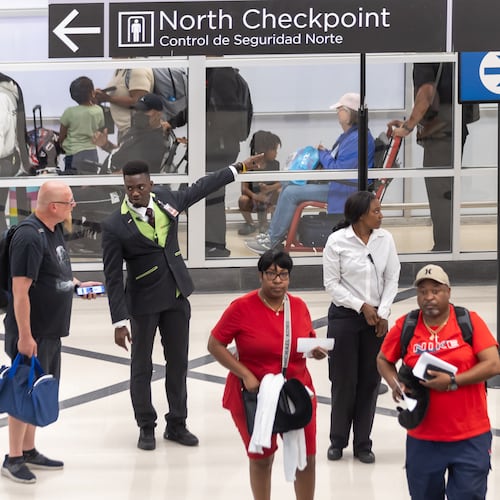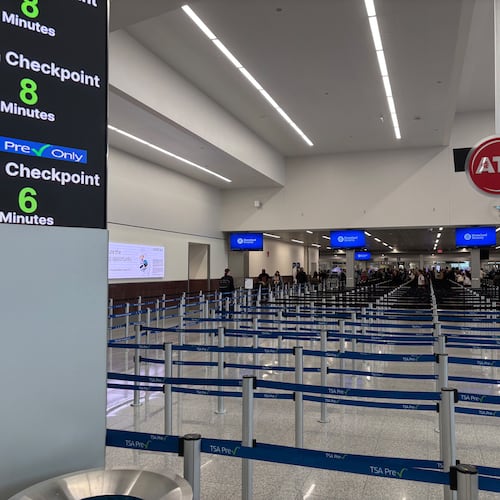The Transportation Security Administration is lifting one of the most hated of airport security hurdles: removing shoes.
The change is now official at all U.S. airports, including Hartsfield-Jackson Atlanta International Airport, Department of Homeland Security Secretary Kristi Noem announced Tuesday afternoon.
“It is something that I know for quite some time people have talked about and discussed,” she said. “We want to improve the travel experience … while maintaining safety standards.”
The agency is also evaluating “every rule” in place at airport security checkpoints, she said.
It marks the end of a mandate put in place nearly 20 years ago, several years after “shoe bomber” Richard Reid’s failed attempt to blow up a flight from Paris to Miami in late 2001.
On a case-by-case basis, some individuals still may be asked to remove their shoes.
But after studying the efficacy of the policy over time with new technology, the agency has deemed shoe removal unnecessary across the board, she said.
The reversal already appeared to be in place before the formal announcement, as multiple passengers in regular security lines told The Atlanta Journal-Constitution they were not asked to remove their shoes.
Media reports of the change began trickling out Saturday, but TSA spokespeople did not reply to questions from the AJC about when exactly the policy rolled out in Atlanta.
Noem noted the change is to “streamline the process and look at efficiencies” as the country prepares for events, including the FIFA World Cup next summer.
Joe Leader, CEO of the Airline Passenger Experience Association and Dunwoody resident, told the AJC his organization estimates this could increase security throughput speeds by 5%-10%.
“We’re very excited with the improvement in the shoe policy,” he said. “We’ve long awaited it.”
TSA PreCheck travelers have already been able to skip removal of shoes, belts or light jackets — for the cost of about $80 for five years.
Travelers 75 or older and 12 or younger also could already keep their shoes on.
Noem predicted “pilot lanes” would open at various airports over the next six to nine months, experimenting with technology that could allow individuals to walk through security without removing any items from their bags or interacting with an officer.
“We’re just getting started,” she said.
She noted some airports also have dedicated lanes for families and active-duty military.
Atlanta began offering front-of-line, expedited PreCheck for active duty military and their families this summer. On particularly crowded days, officials said they might open a dedicated lane for military, as well.
Leader envisions someday passengers will experience “frictionless” screening.
“Imagine a day that you don’t have to present your ID to an agent, but because you’re approved, you walk and go through.”
The current version of this, he said, is the Global Entry “walk-through” camera totems that allow vetted international passengers to pass through customs without stopping, using facial recognition technology.
Leader said he isn’t concerned about these improvements to domestic and international screening processes undermining the value proposition for the government’s trusted traveler programs like PreCheck and Global Entry.
Those programs are where early changes are made, he said, among a more vetted group. And they tend to be followed by even further advances.
“Each time they make an improvement, they’ve worked to provide an additional improvement to other customers,” he said.
Noem pointed out that PreCheck “still adds value.” Those members still won’t have to remove their laptops, tablets, belts and jackets.
About the Author
Keep Reading
The Latest
Featured



